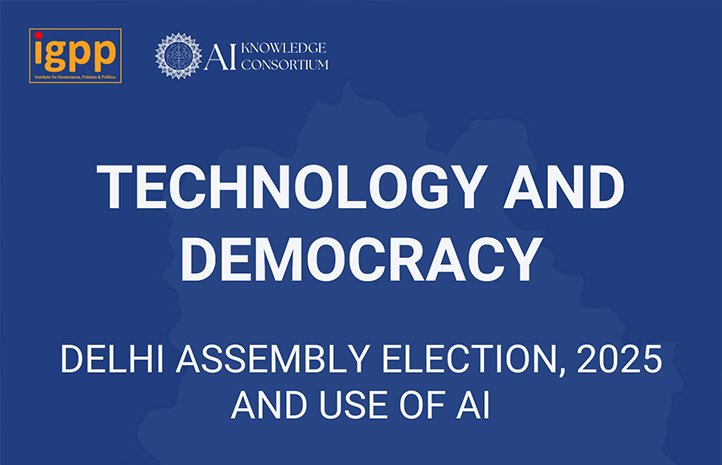The year 2024 has been a remarkable year globally, with elections taking center stage in numerous
countries and India, the world's most populous democracy is one of them. India witnessed the emergence
of a noteworthy new entrant in its political sphere - Artificial Intelligence (AI). Perspectives on this new
entrant range from concerns about an ‘information apocalypse’ to views dismissing it as an ‘overblown
fear.’ Apprehensions have been raised in its regard by various stakeholders ranging from voters,
contestants, academicians, experts to the Elections Commission of India (ECI).
This report highlights the gap between AI’s perceived potential and its real-world implications in electoral
politics. It is part of a series of initiatives undertaken by IGPP, including the ‘Workshop for Policymakers,’
the report on ‘What Indian Parliamentarians Think of AI?’ and the flagship program ‘AI and Your Electoral
Fortune,’ where the IGPP team engaged with Lok Sabha candidates in 2024 to understand the ground
realities of AI use in elections and campaigns.
The next in this series is the report - ‘Technology and Democracy: Delhi Assembly Election, 2025 and the
Use of AI.’ This report aims to analyse the actual impact of AI in elections in Delhi—one of India’s most
digitally literate regions with one of the highest internet penetration rates. The Delhi Assembly Election
2025 provided a unique opportunity to study AI's role in election campaigns and AI-generated content's
influence on voters. With conflicting observations being made worldwide on AI’s role in elections and its
role in redefining the political space and democracy, this report is an attempt to identify its role in Indian
political discourse.
To conduct this study, a multi-pronged approach was employed. This included:
1. Monitoring various media platforms to collect AI use cases,
2. Organizing workshops to gather insights from individuals working on the ground, including campaign
managers, journalists, researchers, and voters who are closely analysing or implementing AI in
elections, and
3. Conducting a survey on AI and the Delhi Assembly Election to gauge public perception of AI-generated
and manipulated content on social media and its influence on voter decision-making.
Elections and campaigns have always been experimental spaces for different actors and integration of
technologies at various levels of elections across different countries. Election campaigning in India has
evolved from traditional approaches like door-to-door campaigning and rallies, pamphlets, radios,
newspapers to modern approaches like TV, the use of social media and now the new entrant AI. The
integration of digital technology in political campaigns in India began during the 2004 elections, driven by
the IT boom in the early 2000s. BJP pioneered its online campaigning with the ‘India Shining’ campaign,
using internet-based advertisements, SMS outreach, and digital posters alongside traditional billboards
(Gowda & Gupta, 2010). The 2009 General elections saw Indian political parties draw inspiration from 2008
US Presidential candidate Barack Obama’s successful digital campaign, expanding outreach through
platforms like YouTube, Facebook, Yahoo, MSN, Orkut, and MySpace. Early 2000s saw online movements
gaining momentum such as ‘Lok Paritran’ in Tamil Nadu and ‘Bengaluru Unites’ mobilised youth, proving
digital platforms' effectiveness in political activism (Gowda & Gupta, 2010). By then, parties were beginning
to realize the importance of digital campaigns, particularly in engaging with first-time voters (Mehra, 2009).
Social media penetration grew from 9% in 2014 to nearly 33% in 2019, making platforms like Facebook,
WhatsApp, and YouTube critical for voter outreach. Hence, social media emerged as the powerful tool in
building, shaping and disseminating narratives among masses. The impact of social media on narrative
building efforts can be understood through two key theories: Mobilization and Reinforcement (Bestvater &
Loyle, 2023; Makatlal & Kumar, 2022; Renner, 2016). Social media has played a crucial role in both aspects.
Mobilization suggests that the internet can reshape political discourse within existing systems by
influencing public opinion and voter behaviour. On the other hand, the Reinforcement theory suggests that
social media strengthens pre-existing beliefs by exposing users primarily to content that aligns with their
ideological preferences. This has been further amplified with the coming of AI.


